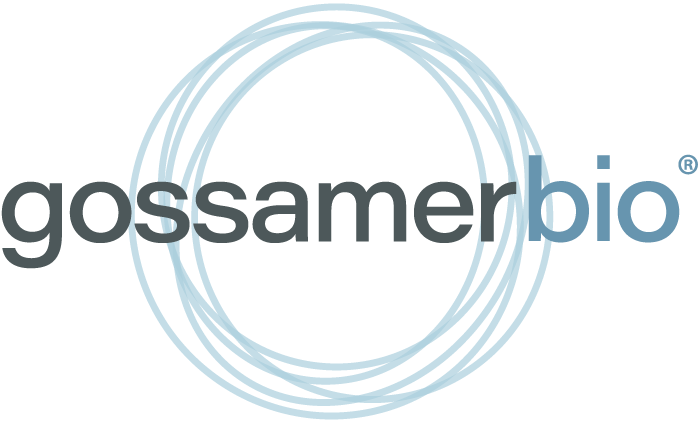– Phase 1/2 trial ongoing with multiple patients dosed in GB1275 monotherapy dose escalation –
– GB1275 granted Orphan Drug Designation for the treatment of pancreatic cancer by the U.S. Food and Drug Administration –
– Preclinical data for GB1275 featured as cover article in July 3rd edition of Science Translational Medicine –
SAN DIEGO--(BUSINESS WIRE)--Nov. 12, 2019--
Gossamer Bio, Inc. (Nasdaq:GOSS), a clinical-stage biopharmaceutical company, today announced that it has entered into a clinical collaboration agreement with Merck (known as MSD outside the US and Canada) to evaluate the combination of Gossamer’s investigational product candidate GB1275, the first-in-class oral modulator of CD11b, and Merck’s anti-PD-1 therapy, KEYTRUDA® (pembrolizumab) in patients with selected advanced solid tumors.
Collaboration with Merck
Under the terms of the agreement, Gossamer will conduct a Phase 1/2 study, KEYNOTE-A36, in advanced solid tumors, with the Phase 1 consisting of dose escalation of three GB1275 regimens including one with KEYTRUDA. Additionally, the Phase 2 consists of expansion cohorts evaluating GB1275 in combination with KEYTRUDA or chemotherapy. Gossamer owns worldwide commercial rights to GB1275.
“We are very excited to collaborate with Merck, an established leader in cancer immunotherapy, on our fourth clinical asset and first oncology agent, GB1275, as we work to improve the lives of cancer patients,” said Sheila Gujrathi, M.D., Chief Executive Officer of Gossamer.
“Immunotherapies are revolutionizing the treatment of patients with certain types of cancers, but there remain many tumor types in which existing immunotherapies have not demonstrated sufficient efficacy,” said Jakob Dupont, M.D., Chief Medical Officer of Gossamer. “Based on the preclinical data and the novel mechanism targeting the CD11b receptor, we believe GB1275’s effect on the immunosuppressive mechanisms in the tumor microenvironment will lead to enhanced anti-tumor activity in combination with KEYTRUDA or chemotherapy.”
GB1275 is an oral modulator of CD11b, a receptor broadly expressed on immunosuppressive myeloid cells found within the tumor microenvironment (TME). In preclinical studies, GB1275 has been shown to reduce the recruitment of these cells into the TME, while also converting the cells within the TME from an immunosuppressive to an active state. The FDA has granted GB1275 orphan drug designation for the treatment of pancreatic cancer.
KEYTRUDA® is a registered trademark of Merck Sharp & Dohme Corp, a subsidiary of Merck & Co., Inc., Kenilworth, NJ, USA.
Phase 1/2 Trial Update
The KEYNOTE-A36 Phase 1/2 trial is underway, enrolling patients at a number of centers of excellence in the United States and United Kingdom for the treatment of selected solid tumor types, including pancreatic, gastric, esophageal, colorectal, prostate and triple negative breast. The Phase 1 portion of the study consists of dose escalation of GB1275 monotherapy. Subsequently, after clearing several monotherapy dose levels, dose escalation combinations will be initiated with KEYTRUDA or chemotherapy. The primary endpoints of the dose escalation phase of the trial are to evaluate the safety, tolerability, and the pharmacokinetics / pharmacodynamics of all three regimens. Biomarkers of immunohistochemistry and other immune monitoring methodologies will also be evaluated.
Gossamer expects to report initial data from the Phase 1 portion of the study in the second half of 2020. An abstract detailing the scientific background for the trial and the study design was presented at the 34th Annual Meeting of the Society for Immunotherapy of Cancer. Additional information about the trial can be found at clinicaltrials.gov (identifier: NCT04060342).
Science Translational Medicine Publication
GB1275 preclinical data generated by labs at the Washington University of St. Louis and Rush University were published as the cover article of the July 3rd edition of Science Translational Medicine. The article, “Agonism of CD11b reprograms innate immunity to sensitize pancreatic cancer to immunotherapies,” contains data demonstrating the efficacy of GB1275 monotherapy and combination therapies with anti-PD-1 and chemotherapy in multiple pancreatic tumor models. Of note, GB1275 and anti-PD-1 combination therapy demonstrated statistically superior efficacy as compared to anti-PD-1 combinations with other macrophage or granulocyte depletion mechanisms, including CSF1R neutralization, CCR2i inhibition, and anti-αLy6G.
About Gossamer Bio
Gossamer Bio is a clinical-stage biopharmaceutical company focused on discovering, acquiring, developing and commercializing therapeutics in the disease areas of immunology, inflammation and oncology. Its goal is to be an industry leader in each of these therapeutic areas and to enhance and extend the lives of patients suffering from such diseases.

View source version on businesswire.com: https://www.businesswire.com/news/home/20191112005259/en/
Source: Gossamer Bio, Inc.
Gossamer Bio:
For Investors:
Argot Partners
Tel 212.600.1902
gossamerbio@argotpartners.com
For Media:
Argot Partners
David Rosen
Tel 212.600.1902
david.rosen@argotpartners.com
